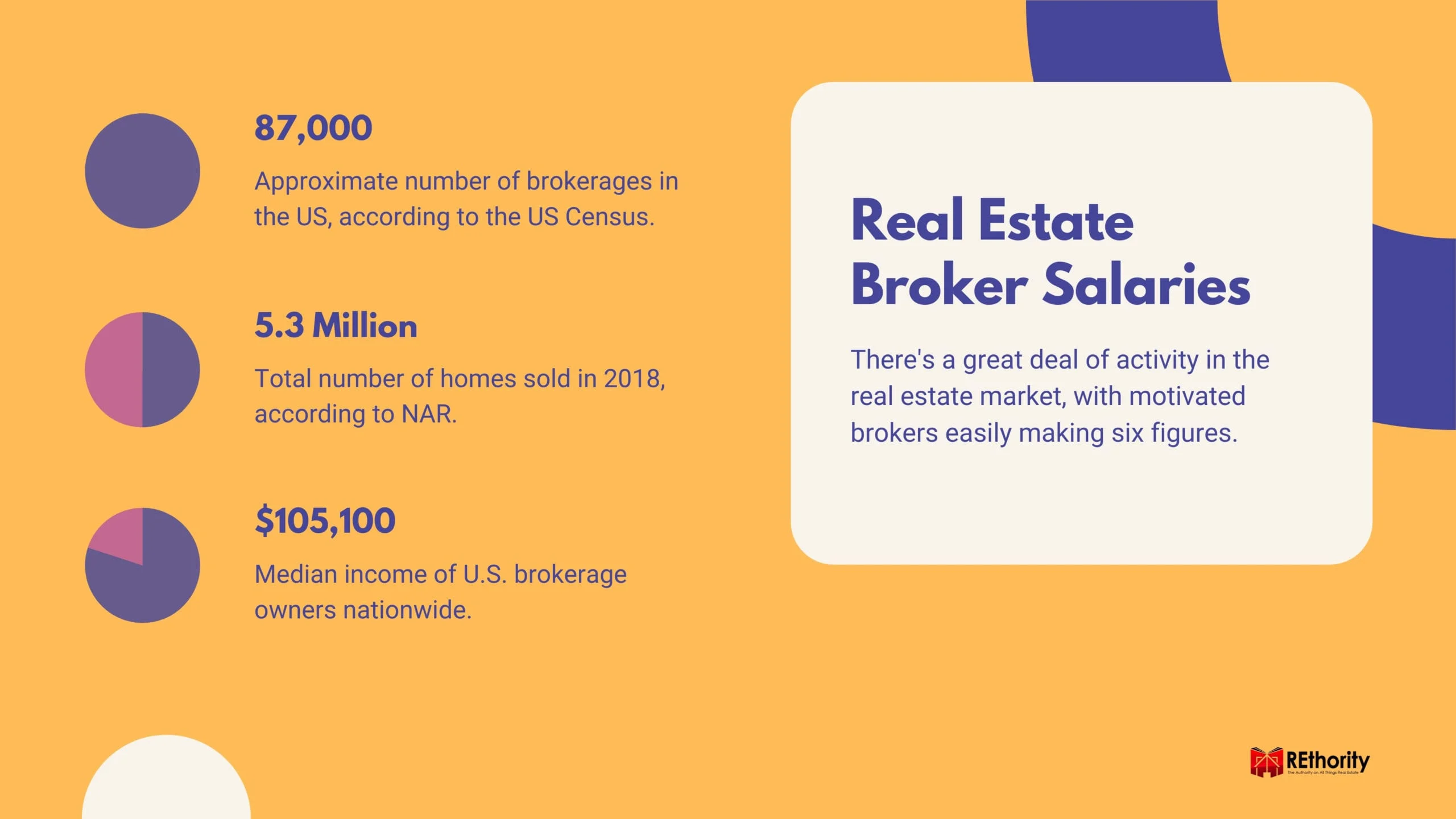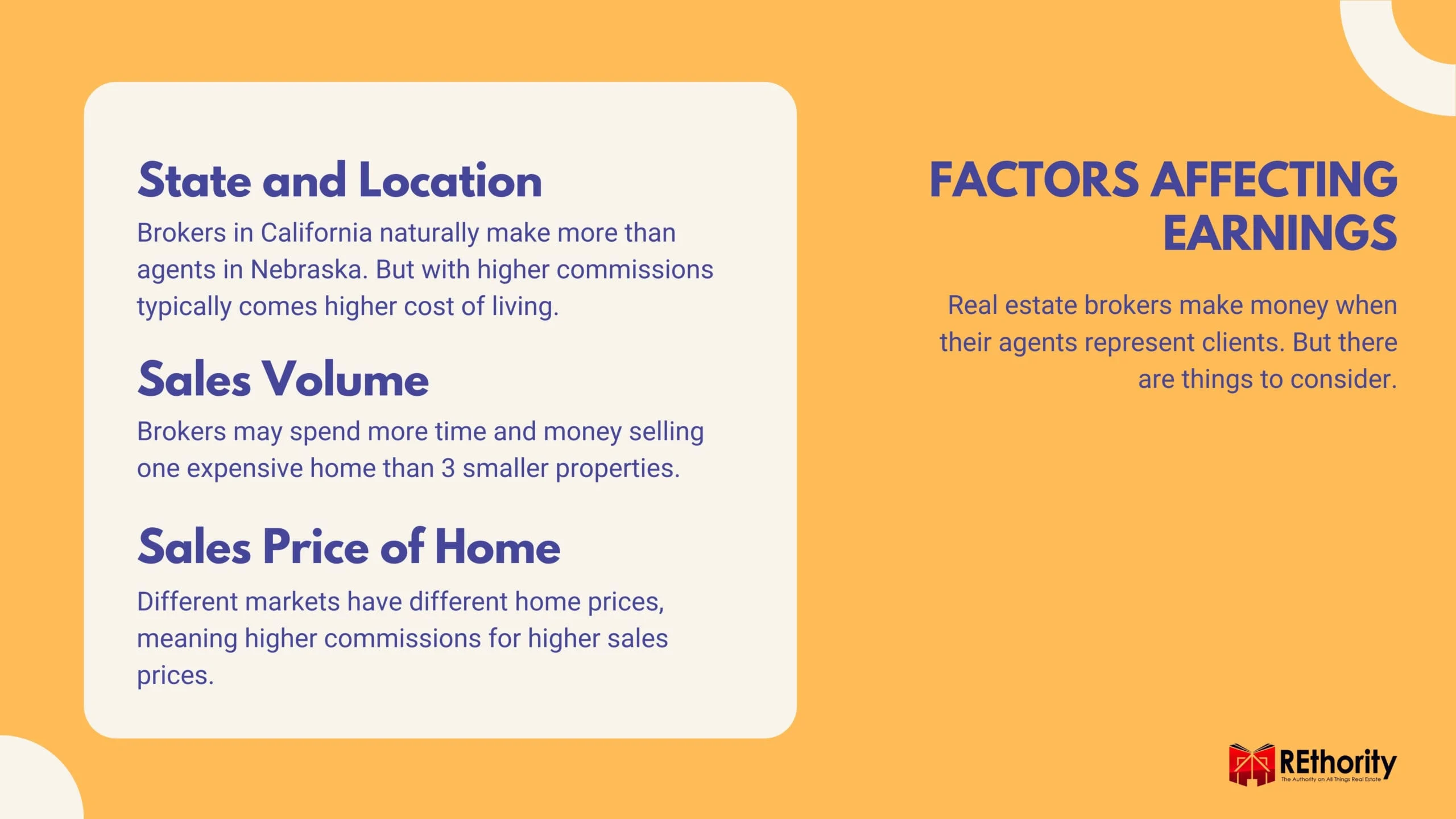Real estate broker salaries fluctuate based on state, agent employed, and property sold.
Read on to learn how much brokers earn in each state and how to boost your own compensation.
- Brokers hold their own license and don’t need to work under or be sponsored by another broker.
- They can open their own brokerages and hire a staff of real estate agents to work under them.
- Real estate broker salaries are higher than real estate agent salaries.
Real Estate Broker Salaries
Real estate brokers are an essential part of real estate transactions in the United States. Realtors and sales agents cannot sell a property without working with a licensed broker.
According to the National Association of Realtors (NAR) 2019 Member Profile, only 20% of licensed realtors hold broker licenses (compared to 68% with sales licenses and 14% with associate broker licenses).

Some real estate agents decide to go on to become brokers by upgrading their license. There are a few reasons you might want to become a broker.
In short, being a broker gives real estate professionals more independence and income-earning opportunities. Let’s look at how brokers get paid and the average real estate broker salaries throughout the United States next.
How Do Brokers Get Paid?
Brokers don’t technically earn an annual salary. Instead, they get paid by earning a percentage of a real estate transaction.
Say a home or commercial real estate property is sold by an agent working under a broker (or by the broker themselves).
The seller pays a commission of about 5–6% to the brokers on each side of the transaction (the broker over the buyer’s agent and the broker over the seller’s own agent).
Let’s say the commission is 6%. On a $200,000 property, that equates to $12,000 being split two ways: the buyer’s agent’s broker and the listing agent’s broker.
Each broker ends up with $6,000 in commissions. But that’s not the amount they earn on this sale.

The agents involved take home a portion of that commission that was agreed upon beforehand. Some brokers offer 50/50 commission splits, but others might offer 60/40, 70/30, or even 80/20 splits.
Using a 50/50 commission split out of a total $6,000 commission as our example, that agent will earn $3,000—50% of their broker’s side of the commission. The broker keeps the other half ($3,000) of the commission. This is how brokers get paid.
As you can imagine, brokers that have successful, top-performing real estate sales agents working under them make more money because a greater number of homes (and more expensive homes) are sold.
What Is the Average Real Estate Broker Salary?
The average income or “salary” of a broker nationwide is $70,400, according to last year’s NAR report. The average amount of income varies depending on a few factors, including location, number of agents working under the broker, years of experience, and the broker’s role.
One of the most important income factors is the state the broker works in. A broker in New York, for example, might make an average of $30,000 more per year than a broker in North Carolina. According to a Ziprecruiter study, the average broker salary is below:
Alabama: $87,195
Alaska: $99,289
Arizona: $96,178
Arkansas: $88,350
California: $97,700
Colorado: $94,301
Connecticut: $99,295
Delaware: $93,294
Florida: $83,696
Georgia: $88,685
Hawaii: $99,583
Idaho: $99,289
Illinois: $86,824
Indiana: $91,744
Iowa: $90,518
Kansas: $90,811
Kentucky: $92,270
Louisiana: $91,251
Maine: $90,725
Maryland: $100,054
Massachusetts: $107,799
Michigan: $87,099
Minnesota: $93,879
Mississippi: $85,844
Missouri: $84,970
Montana: $99,289
Nebraska: $98,832
Nevada: $99,289
New Hampshire: $105,183
New Jersey: $95,561
New Mexico: $87,849
New York: $108,581
North Carolina: $76,118
North Dakota: $99,289
Ohio: $92,374
Oklahoma: $91,518
Oregon: $93,206
Pennsylvania: $93,873
Rhode Island: $97,756
South Carolina: $93,700
South Dakota: $93,838
Tennessee: $93,336
Texas: $89,004
Utah: $92,554
Vermont: $99,025
Virginia: $97,216
Washington: $98,775
West Virginia: $94,246
Wisconsin: $91,093
Wyoming: $99,289
Number of Agents
Another factor that determines how much a broker makes is the number of agents working under them, if any. If a broker is the sole owner of their own brokerage or a managing broker at an existing brokerage, they earn part of their agents’ commissions.
Not every broker has a team of agents. Some continue to sell properties. Each agent is responsible for selling homes or commercial properties, which bring commissions into the brokerage.
The broker keeps a percentage of those commissions, ranging anywhere from 20% to 70%. The rest belongs to the agent who made the sale.
Years of Experience
The number of years of experience a broker has also affects their income. Their average annual income is $70,400, compared to the average real estate agent income of $41,289.
This is due in part to the fact that brokers must work as real estate agents for at least two years in most states before applying for a broker license.

Role in the Brokerage
Brokers can work in a few different roles and hold different titles within a brokerage. Those titles (in order from the highest income potential to the lowest) are:
- Broker/Owner (Median income: $105,100)
- Managing Broker/Sales Agent (Median income: $93,200)
- Managing Broker (Median income: $88,200)
- Broker/Owner/Sales Agent (Median income: $86,100)
- Associate Broker (Median income: $61,000)
Some brokers continue to sell properties in their role as a broker, owner, associate broker, or manager. These roles differ in a few ways.
Brokers and owners own their brokerage and hire a team of agents to work under them. They may or may not continue to sell properties in this role. Brokers and owners who don’t continue to sell earn more income on average.
This could be due to the increased focus they can put into growing the brokerage and keeping a team of top-producing agents.
Managing brokers work for an existing brokerage and are the heads of a team of real estate agents. They earn a commission from the agents’ sales. They may or may not continue to sell properties in this role.
Managing brokers who continue to sell earn more on average than managing brokers who don’t. Associate brokers are former sales agents who have passed the broker licensing exam but continue to or begin to work under another licensed broker.
They do not manage a team of agents, just their own sales. They earn the least annual income of the other broker roles because they don’t earn additional commissions from a team of agents.
Is It Worth It to Become a Real Estate Broker?
With a national average of more than $70,000 in earnings per year, brokers earn a good income and have more independence than real estate sales agents.
They also have more income-earning opportunities than sales agents, with the ability to manage a team of agents at an existing brokerage or to start their own brokerage.
If you’re considering upgrading your real estate license to become a broker, you’ll want to consider the average broker’s income in the state you’re living in, the number of agents you’d have working under you (if any), your years of experience in real estate, and the role you’d plan to have at a brokerage.
Only 34% of realtors hold broker or associate broker licenses, and the rest stay in real estate sales. If you’re shooting for higher earnings and more income-earning potential in the future, becoming a broker could be the right path for you.
Our Favorite Real Estate School
Let’s face it: it’s the digital age, and your schedule is busy. Why tie yourself to a set schedule by choosing a brick-and-mortar school? Don’t worry, there’s an alternative.
Real Estate Express offers flexible course options that are completely online. This means you can take your real estate courses from the comfort of your own living room, whenever it is convenient for you.

